Leadership and Management in Sports: A Rugby Captain's Report
VerifiedAdded on 2022/08/24
|14
|3751
|15
Report
AI Summary
This report delves into the realm of leadership and management within the context of sports, specifically focusing on the experiences of a rugby captain. It begins with a personal reflection on the captain's leadership style, identifying transformational leadership as the preferred approach, and analyzing their decision-making abilities, which lean towards a compliant style based on statistical data. The report then addresses the issues faced in decision-making, such as a reliance on preconceived ideas and a lack of adaptability, and proposes remedies including developing intuitive skills through meditation and seeking guidance from a psychiatrist. Furthermore, the report integrates academic perspectives on decision-making in leadership, examining the facets and limitations of the compliant style, drawing upon research to support the analysis. The document highlights the importance of effective decision-making in sports, where risks and uncertainties are prevalent, and concludes by emphasizing the need for adaptability and intuitive skills in leadership roles. The report effectively blends personal experiences with academic research to provide a comprehensive understanding of leadership challenges and solutions in the sports domain.
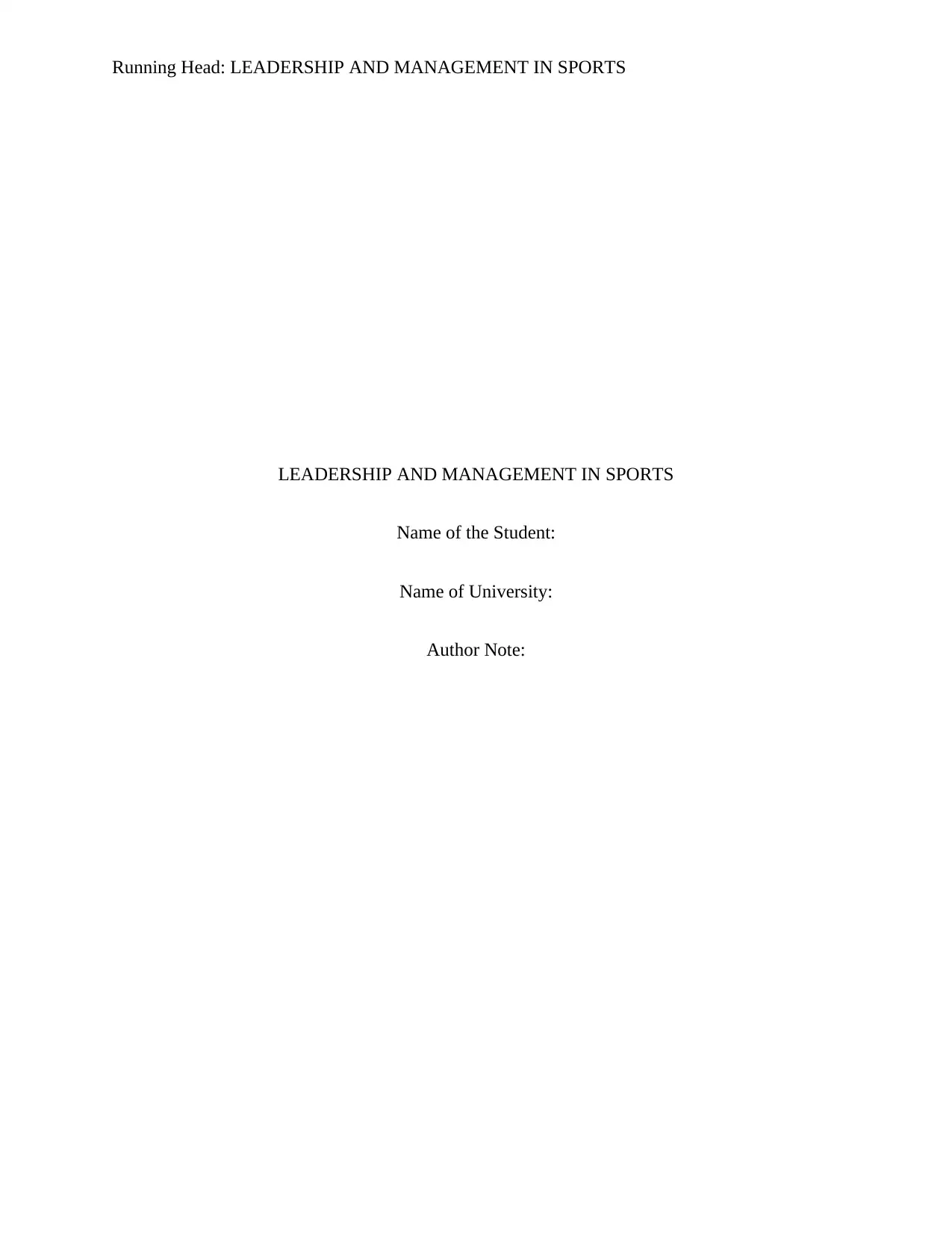
Running Head: LEADERSHIP AND MANAGEMENT IN SPORTS
LEADERSHIP AND MANAGEMENT IN SPORTS
Name of the Student:
Name of University:
Author Note:
LEADERSHIP AND MANAGEMENT IN SPORTS
Name of the Student:
Name of University:
Author Note:
Paraphrase This Document
Need a fresh take? Get an instant paraphrase of this document with our AI Paraphraser
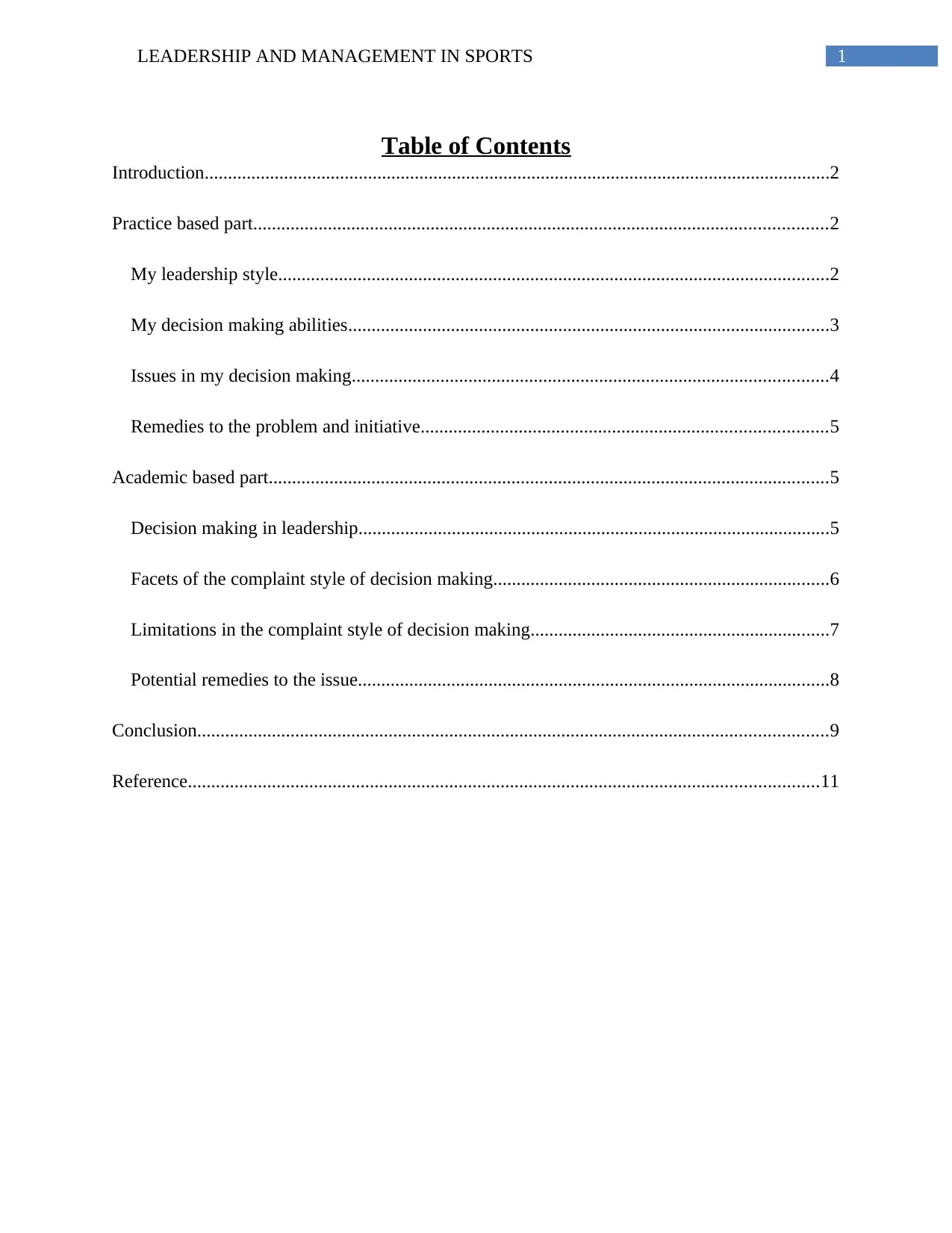
1LEADERSHIP AND MANAGEMENT IN SPORTS
Table of Contents
Introduction......................................................................................................................................2
Practice based part...........................................................................................................................2
My leadership style......................................................................................................................2
My decision making abilities.......................................................................................................3
Issues in my decision making......................................................................................................4
Remedies to the problem and initiative.......................................................................................5
Academic based part........................................................................................................................5
Decision making in leadership.....................................................................................................5
Facets of the complaint style of decision making........................................................................6
Limitations in the complaint style of decision making................................................................7
Potential remedies to the issue.....................................................................................................8
Conclusion.......................................................................................................................................9
Reference.......................................................................................................................................11
Table of Contents
Introduction......................................................................................................................................2
Practice based part...........................................................................................................................2
My leadership style......................................................................................................................2
My decision making abilities.......................................................................................................3
Issues in my decision making......................................................................................................4
Remedies to the problem and initiative.......................................................................................5
Academic based part........................................................................................................................5
Decision making in leadership.....................................................................................................5
Facets of the complaint style of decision making........................................................................6
Limitations in the complaint style of decision making................................................................7
Potential remedies to the issue.....................................................................................................8
Conclusion.......................................................................................................................................9
Reference.......................................................................................................................................11
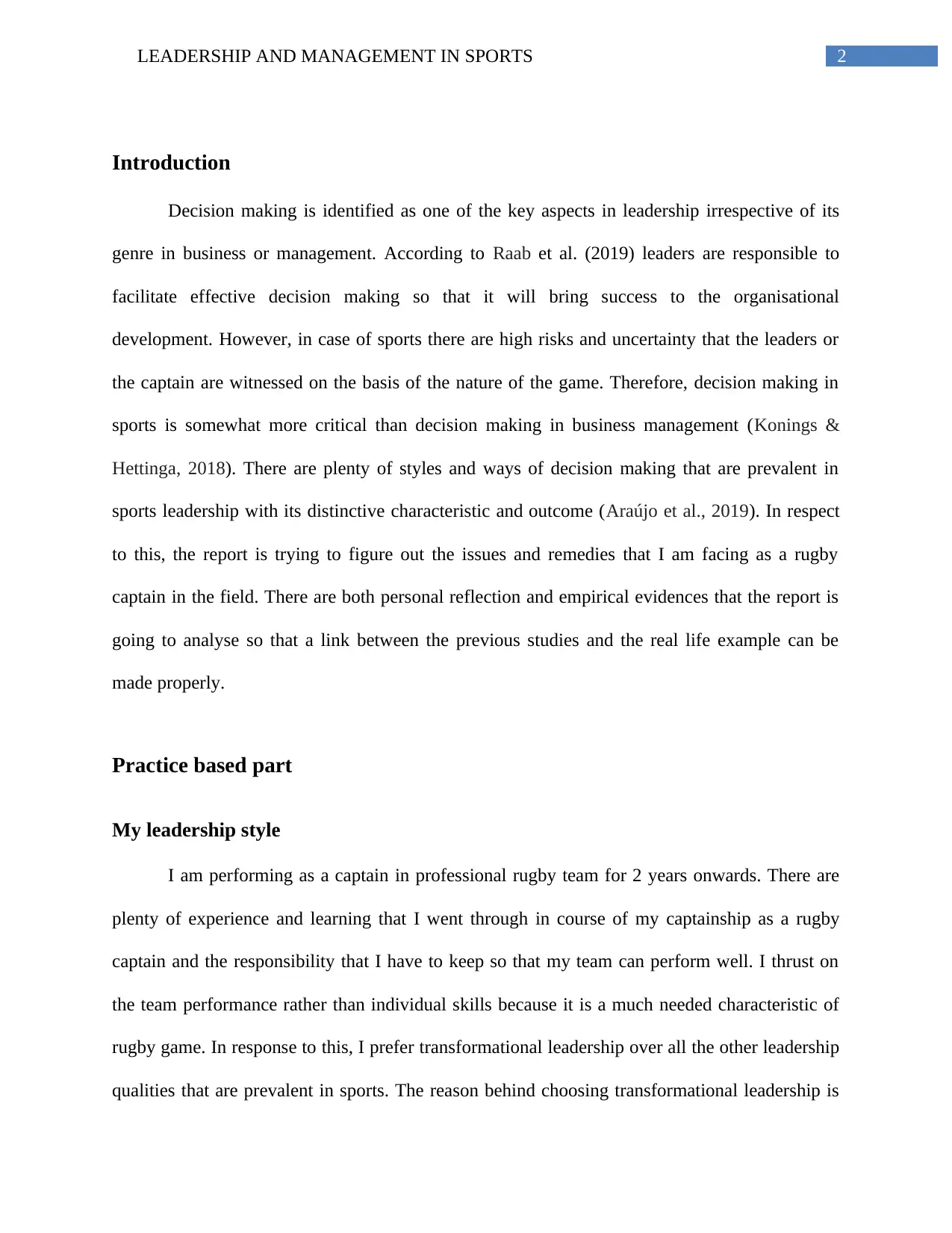
2LEADERSHIP AND MANAGEMENT IN SPORTS
Introduction
Decision making is identified as one of the key aspects in leadership irrespective of its
genre in business or management. According to Raab et al. (2019) leaders are responsible to
facilitate effective decision making so that it will bring success to the organisational
development. However, in case of sports there are high risks and uncertainty that the leaders or
the captain are witnessed on the basis of the nature of the game. Therefore, decision making in
sports is somewhat more critical than decision making in business management (Konings &
Hettinga, 2018). There are plenty of styles and ways of decision making that are prevalent in
sports leadership with its distinctive characteristic and outcome (Araújo et al., 2019). In respect
to this, the report is trying to figure out the issues and remedies that I am facing as a rugby
captain in the field. There are both personal reflection and empirical evidences that the report is
going to analyse so that a link between the previous studies and the real life example can be
made properly.
Practice based part
My leadership style
I am performing as a captain in professional rugby team for 2 years onwards. There are
plenty of experience and learning that I went through in course of my captainship as a rugby
captain and the responsibility that I have to keep so that my team can perform well. I thrust on
the team performance rather than individual skills because it is a much needed characteristic of
rugby game. In response to this, I prefer transformational leadership over all the other leadership
qualities that are prevalent in sports. The reason behind choosing transformational leadership is
Introduction
Decision making is identified as one of the key aspects in leadership irrespective of its
genre in business or management. According to Raab et al. (2019) leaders are responsible to
facilitate effective decision making so that it will bring success to the organisational
development. However, in case of sports there are high risks and uncertainty that the leaders or
the captain are witnessed on the basis of the nature of the game. Therefore, decision making in
sports is somewhat more critical than decision making in business management (Konings &
Hettinga, 2018). There are plenty of styles and ways of decision making that are prevalent in
sports leadership with its distinctive characteristic and outcome (Araújo et al., 2019). In respect
to this, the report is trying to figure out the issues and remedies that I am facing as a rugby
captain in the field. There are both personal reflection and empirical evidences that the report is
going to analyse so that a link between the previous studies and the real life example can be
made properly.
Practice based part
My leadership style
I am performing as a captain in professional rugby team for 2 years onwards. There are
plenty of experience and learning that I went through in course of my captainship as a rugby
captain and the responsibility that I have to keep so that my team can perform well. I thrust on
the team performance rather than individual skills because it is a much needed characteristic of
rugby game. In response to this, I prefer transformational leadership over all the other leadership
qualities that are prevalent in sports. The reason behind choosing transformational leadership is
⊘ This is a preview!⊘
Do you want full access?
Subscribe today to unlock all pages.

Trusted by 1+ million students worldwide
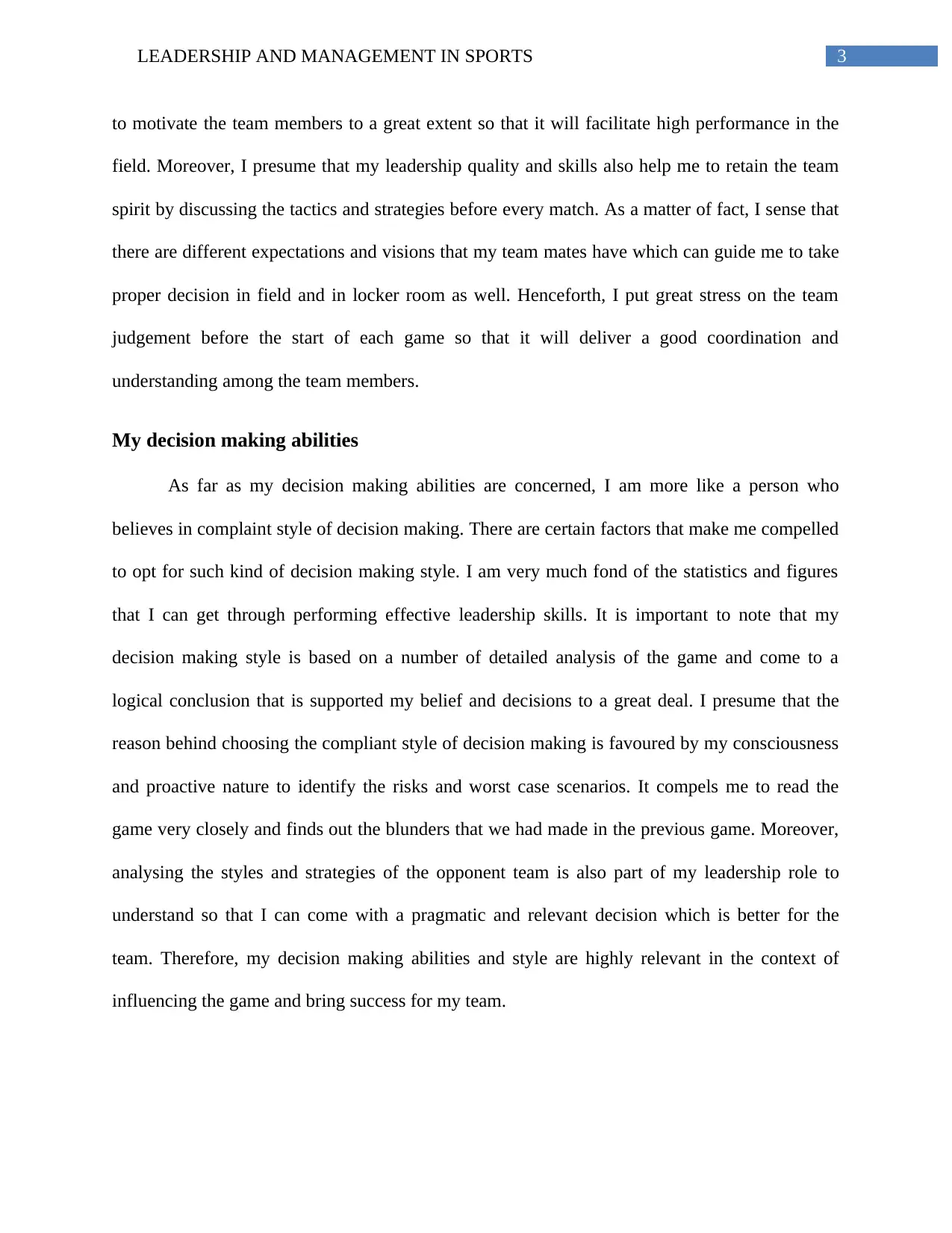
3LEADERSHIP AND MANAGEMENT IN SPORTS
to motivate the team members to a great extent so that it will facilitate high performance in the
field. Moreover, I presume that my leadership quality and skills also help me to retain the team
spirit by discussing the tactics and strategies before every match. As a matter of fact, I sense that
there are different expectations and visions that my team mates have which can guide me to take
proper decision in field and in locker room as well. Henceforth, I put great stress on the team
judgement before the start of each game so that it will deliver a good coordination and
understanding among the team members.
My decision making abilities
As far as my decision making abilities are concerned, I am more like a person who
believes in complaint style of decision making. There are certain factors that make me compelled
to opt for such kind of decision making style. I am very much fond of the statistics and figures
that I can get through performing effective leadership skills. It is important to note that my
decision making style is based on a number of detailed analysis of the game and come to a
logical conclusion that is supported my belief and decisions to a great deal. I presume that the
reason behind choosing the compliant style of decision making is favoured by my consciousness
and proactive nature to identify the risks and worst case scenarios. It compels me to read the
game very closely and finds out the blunders that we had made in the previous game. Moreover,
analysing the styles and strategies of the opponent team is also part of my leadership role to
understand so that I can come with a pragmatic and relevant decision which is better for the
team. Therefore, my decision making abilities and style are highly relevant in the context of
influencing the game and bring success for my team.
to motivate the team members to a great extent so that it will facilitate high performance in the
field. Moreover, I presume that my leadership quality and skills also help me to retain the team
spirit by discussing the tactics and strategies before every match. As a matter of fact, I sense that
there are different expectations and visions that my team mates have which can guide me to take
proper decision in field and in locker room as well. Henceforth, I put great stress on the team
judgement before the start of each game so that it will deliver a good coordination and
understanding among the team members.
My decision making abilities
As far as my decision making abilities are concerned, I am more like a person who
believes in complaint style of decision making. There are certain factors that make me compelled
to opt for such kind of decision making style. I am very much fond of the statistics and figures
that I can get through performing effective leadership skills. It is important to note that my
decision making style is based on a number of detailed analysis of the game and come to a
logical conclusion that is supported my belief and decisions to a great deal. I presume that the
reason behind choosing the compliant style of decision making is favoured by my consciousness
and proactive nature to identify the risks and worst case scenarios. It compels me to read the
game very closely and finds out the blunders that we had made in the previous game. Moreover,
analysing the styles and strategies of the opponent team is also part of my leadership role to
understand so that I can come with a pragmatic and relevant decision which is better for the
team. Therefore, my decision making abilities and style are highly relevant in the context of
influencing the game and bring success for my team.
Paraphrase This Document
Need a fresh take? Get an instant paraphrase of this document with our AI Paraphraser
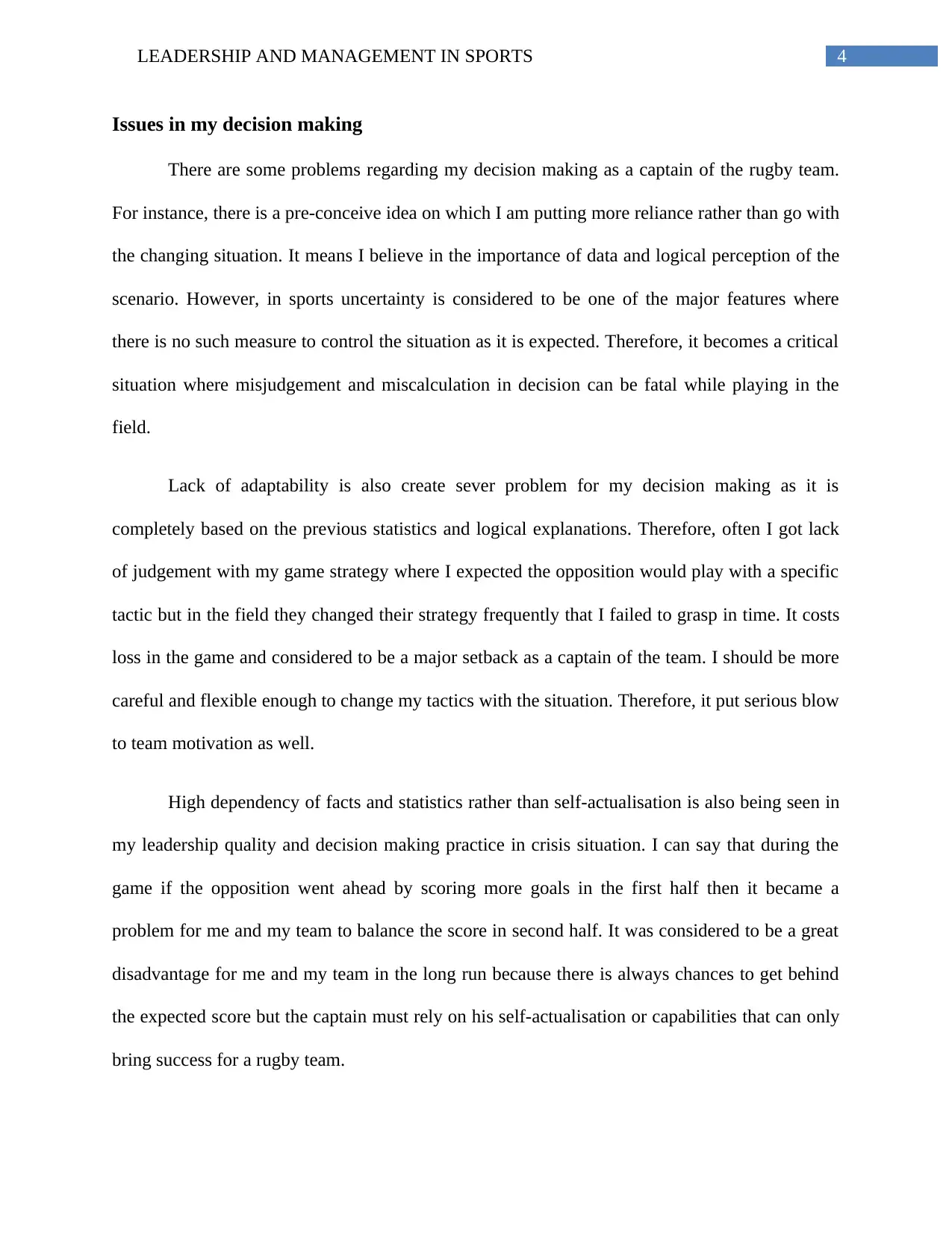
4LEADERSHIP AND MANAGEMENT IN SPORTS
Issues in my decision making
There are some problems regarding my decision making as a captain of the rugby team.
For instance, there is a pre-conceive idea on which I am putting more reliance rather than go with
the changing situation. It means I believe in the importance of data and logical perception of the
scenario. However, in sports uncertainty is considered to be one of the major features where
there is no such measure to control the situation as it is expected. Therefore, it becomes a critical
situation where misjudgement and miscalculation in decision can be fatal while playing in the
field.
Lack of adaptability is also create sever problem for my decision making as it is
completely based on the previous statistics and logical explanations. Therefore, often I got lack
of judgement with my game strategy where I expected the opposition would play with a specific
tactic but in the field they changed their strategy frequently that I failed to grasp in time. It costs
loss in the game and considered to be a major setback as a captain of the team. I should be more
careful and flexible enough to change my tactics with the situation. Therefore, it put serious blow
to team motivation as well.
High dependency of facts and statistics rather than self-actualisation is also being seen in
my leadership quality and decision making practice in crisis situation. I can say that during the
game if the opposition went ahead by scoring more goals in the first half then it became a
problem for me and my team to balance the score in second half. It was considered to be a great
disadvantage for me and my team in the long run because there is always chances to get behind
the expected score but the captain must rely on his self-actualisation or capabilities that can only
bring success for a rugby team.
Issues in my decision making
There are some problems regarding my decision making as a captain of the rugby team.
For instance, there is a pre-conceive idea on which I am putting more reliance rather than go with
the changing situation. It means I believe in the importance of data and logical perception of the
scenario. However, in sports uncertainty is considered to be one of the major features where
there is no such measure to control the situation as it is expected. Therefore, it becomes a critical
situation where misjudgement and miscalculation in decision can be fatal while playing in the
field.
Lack of adaptability is also create sever problem for my decision making as it is
completely based on the previous statistics and logical explanations. Therefore, often I got lack
of judgement with my game strategy where I expected the opposition would play with a specific
tactic but in the field they changed their strategy frequently that I failed to grasp in time. It costs
loss in the game and considered to be a major setback as a captain of the team. I should be more
careful and flexible enough to change my tactics with the situation. Therefore, it put serious blow
to team motivation as well.
High dependency of facts and statistics rather than self-actualisation is also being seen in
my leadership quality and decision making practice in crisis situation. I can say that during the
game if the opposition went ahead by scoring more goals in the first half then it became a
problem for me and my team to balance the score in second half. It was considered to be a great
disadvantage for me and my team in the long run because there is always chances to get behind
the expected score but the captain must rely on his self-actualisation or capabilities that can only
bring success for a rugby team.
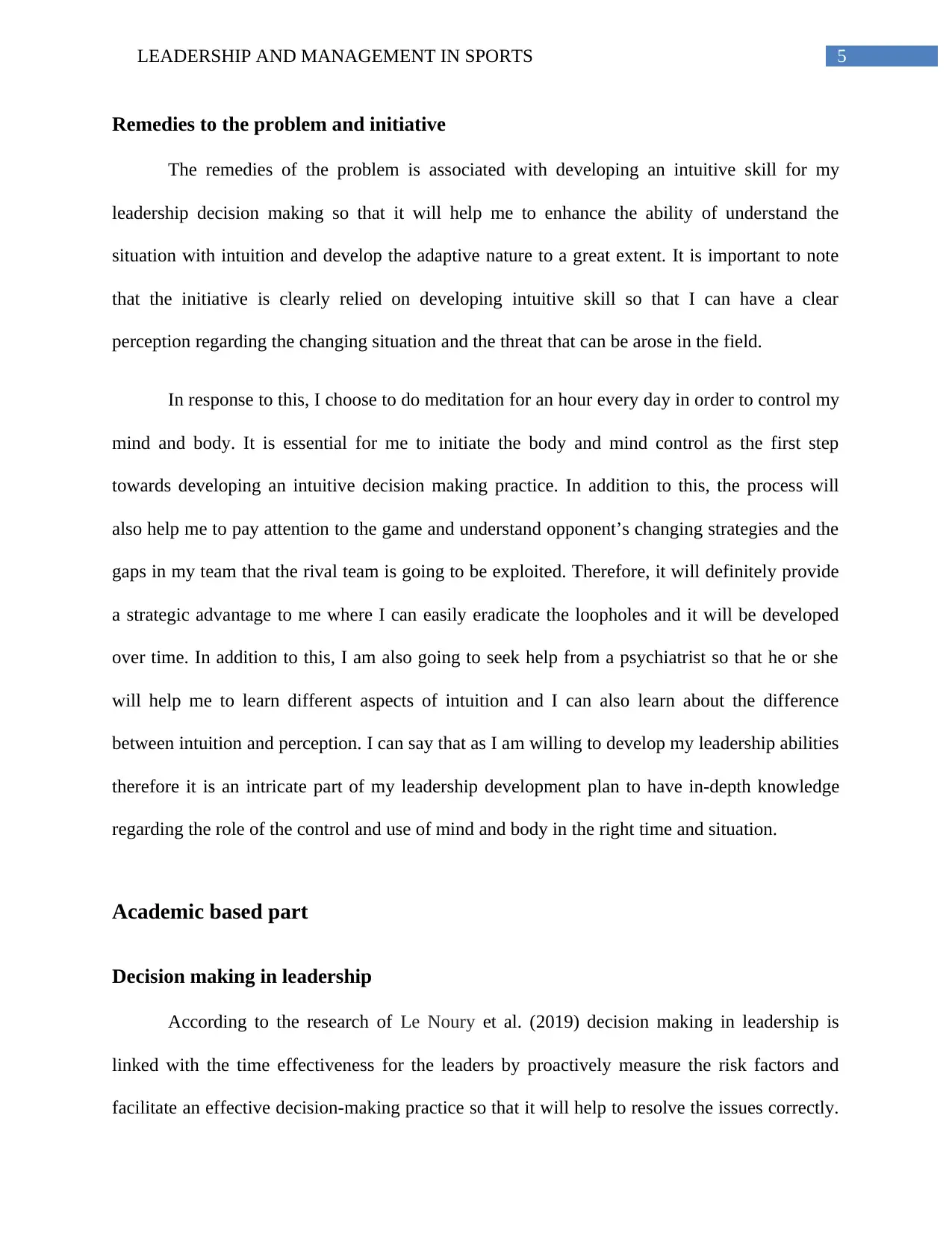
5LEADERSHIP AND MANAGEMENT IN SPORTS
Remedies to the problem and initiative
The remedies of the problem is associated with developing an intuitive skill for my
leadership decision making so that it will help me to enhance the ability of understand the
situation with intuition and develop the adaptive nature to a great extent. It is important to note
that the initiative is clearly relied on developing intuitive skill so that I can have a clear
perception regarding the changing situation and the threat that can be arose in the field.
In response to this, I choose to do meditation for an hour every day in order to control my
mind and body. It is essential for me to initiate the body and mind control as the first step
towards developing an intuitive decision making practice. In addition to this, the process will
also help me to pay attention to the game and understand opponent’s changing strategies and the
gaps in my team that the rival team is going to be exploited. Therefore, it will definitely provide
a strategic advantage to me where I can easily eradicate the loopholes and it will be developed
over time. In addition to this, I am also going to seek help from a psychiatrist so that he or she
will help me to learn different aspects of intuition and I can also learn about the difference
between intuition and perception. I can say that as I am willing to develop my leadership abilities
therefore it is an intricate part of my leadership development plan to have in-depth knowledge
regarding the role of the control and use of mind and body in the right time and situation.
Academic based part
Decision making in leadership
According to the research of Le Noury et al. (2019) decision making in leadership is
linked with the time effectiveness for the leaders by proactively measure the risk factors and
facilitate an effective decision-making practice so that it will help to resolve the issues correctly.
Remedies to the problem and initiative
The remedies of the problem is associated with developing an intuitive skill for my
leadership decision making so that it will help me to enhance the ability of understand the
situation with intuition and develop the adaptive nature to a great extent. It is important to note
that the initiative is clearly relied on developing intuitive skill so that I can have a clear
perception regarding the changing situation and the threat that can be arose in the field.
In response to this, I choose to do meditation for an hour every day in order to control my
mind and body. It is essential for me to initiate the body and mind control as the first step
towards developing an intuitive decision making practice. In addition to this, the process will
also help me to pay attention to the game and understand opponent’s changing strategies and the
gaps in my team that the rival team is going to be exploited. Therefore, it will definitely provide
a strategic advantage to me where I can easily eradicate the loopholes and it will be developed
over time. In addition to this, I am also going to seek help from a psychiatrist so that he or she
will help me to learn different aspects of intuition and I can also learn about the difference
between intuition and perception. I can say that as I am willing to develop my leadership abilities
therefore it is an intricate part of my leadership development plan to have in-depth knowledge
regarding the role of the control and use of mind and body in the right time and situation.
Academic based part
Decision making in leadership
According to the research of Le Noury et al. (2019) decision making in leadership is
linked with the time effectiveness for the leaders by proactively measure the risk factors and
facilitate an effective decision-making practice so that it will help to resolve the issues correctly.
⊘ This is a preview!⊘
Do you want full access?
Subscribe today to unlock all pages.

Trusted by 1+ million students worldwide
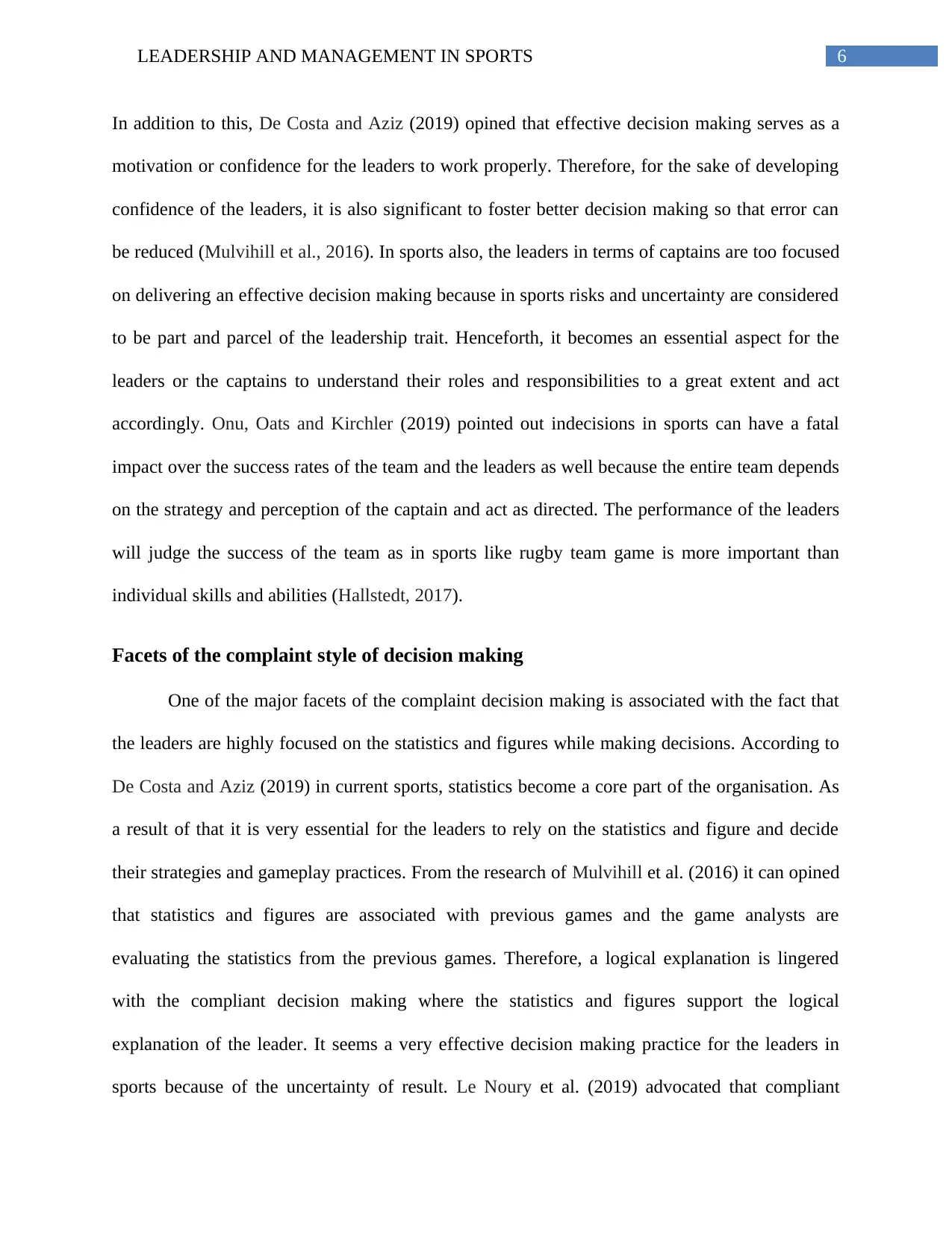
6LEADERSHIP AND MANAGEMENT IN SPORTS
In addition to this, De Costa and Aziz (2019) opined that effective decision making serves as a
motivation or confidence for the leaders to work properly. Therefore, for the sake of developing
confidence of the leaders, it is also significant to foster better decision making so that error can
be reduced (Mulvihill et al., 2016). In sports also, the leaders in terms of captains are too focused
on delivering an effective decision making because in sports risks and uncertainty are considered
to be part and parcel of the leadership trait. Henceforth, it becomes an essential aspect for the
leaders or the captains to understand their roles and responsibilities to a great extent and act
accordingly. Onu, Oats and Kirchler (2019) pointed out indecisions in sports can have a fatal
impact over the success rates of the team and the leaders as well because the entire team depends
on the strategy and perception of the captain and act as directed. The performance of the leaders
will judge the success of the team as in sports like rugby team game is more important than
individual skills and abilities (Hallstedt, 2017).
Facets of the complaint style of decision making
One of the major facets of the complaint decision making is associated with the fact that
the leaders are highly focused on the statistics and figures while making decisions. According to
De Costa and Aziz (2019) in current sports, statistics become a core part of the organisation. As
a result of that it is very essential for the leaders to rely on the statistics and figure and decide
their strategies and gameplay practices. From the research of Mulvihill et al. (2016) it can opined
that statistics and figures are associated with previous games and the game analysts are
evaluating the statistics from the previous games. Therefore, a logical explanation is lingered
with the compliant decision making where the statistics and figures support the logical
explanation of the leader. It seems a very effective decision making practice for the leaders in
sports because of the uncertainty of result. Le Noury et al. (2019) advocated that compliant
In addition to this, De Costa and Aziz (2019) opined that effective decision making serves as a
motivation or confidence for the leaders to work properly. Therefore, for the sake of developing
confidence of the leaders, it is also significant to foster better decision making so that error can
be reduced (Mulvihill et al., 2016). In sports also, the leaders in terms of captains are too focused
on delivering an effective decision making because in sports risks and uncertainty are considered
to be part and parcel of the leadership trait. Henceforth, it becomes an essential aspect for the
leaders or the captains to understand their roles and responsibilities to a great extent and act
accordingly. Onu, Oats and Kirchler (2019) pointed out indecisions in sports can have a fatal
impact over the success rates of the team and the leaders as well because the entire team depends
on the strategy and perception of the captain and act as directed. The performance of the leaders
will judge the success of the team as in sports like rugby team game is more important than
individual skills and abilities (Hallstedt, 2017).
Facets of the complaint style of decision making
One of the major facets of the complaint decision making is associated with the fact that
the leaders are highly focused on the statistics and figures while making decisions. According to
De Costa and Aziz (2019) in current sports, statistics become a core part of the organisation. As
a result of that it is very essential for the leaders to rely on the statistics and figure and decide
their strategies and gameplay practices. From the research of Mulvihill et al. (2016) it can opined
that statistics and figures are associated with previous games and the game analysts are
evaluating the statistics from the previous games. Therefore, a logical explanation is lingered
with the compliant decision making where the statistics and figures support the logical
explanation of the leader. It seems a very effective decision making practice for the leaders in
sports because of the uncertainty of result. Le Noury et al. (2019) advocated that compliant
Paraphrase This Document
Need a fresh take? Get an instant paraphrase of this document with our AI Paraphraser
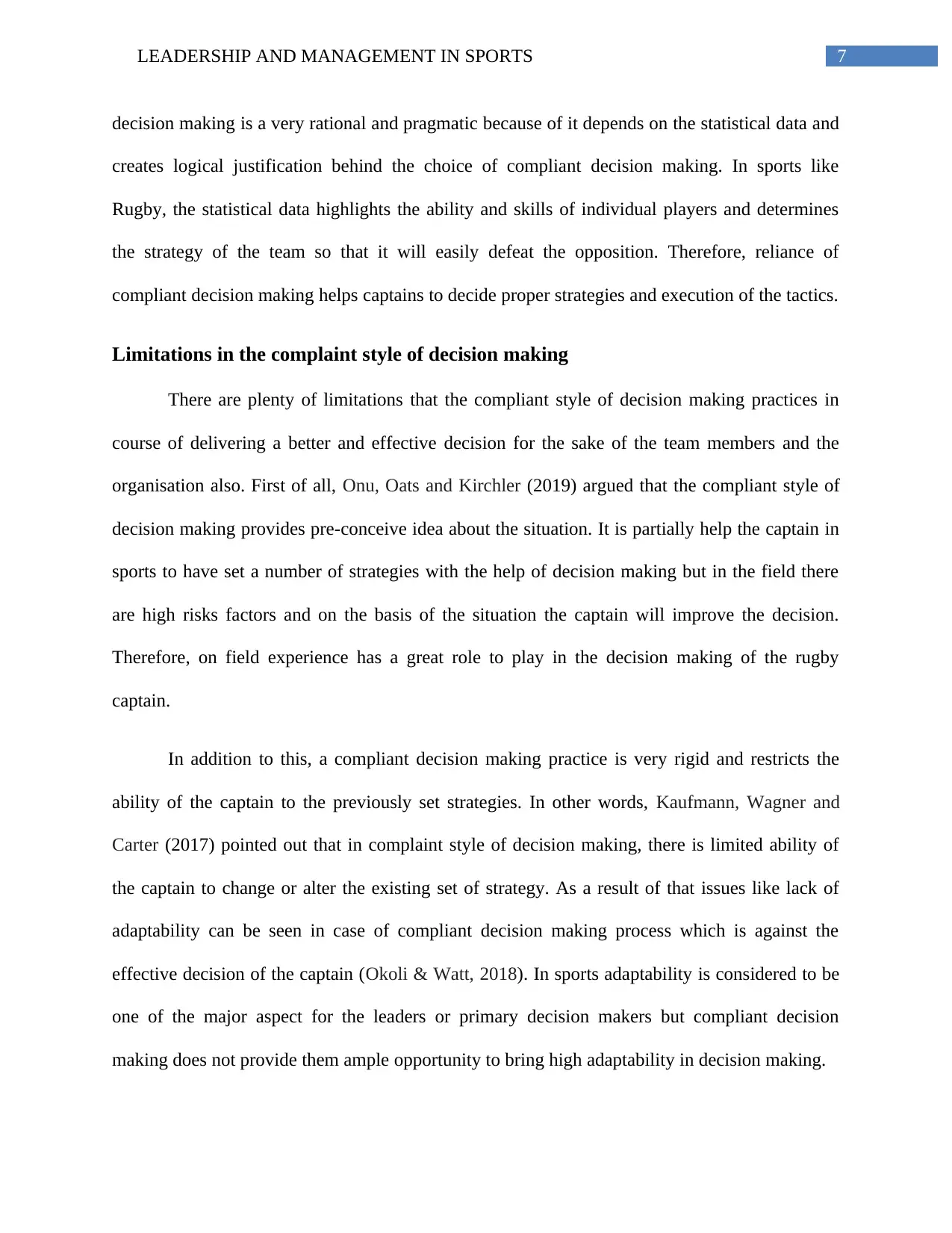
7LEADERSHIP AND MANAGEMENT IN SPORTS
decision making is a very rational and pragmatic because of it depends on the statistical data and
creates logical justification behind the choice of compliant decision making. In sports like
Rugby, the statistical data highlights the ability and skills of individual players and determines
the strategy of the team so that it will easily defeat the opposition. Therefore, reliance of
compliant decision making helps captains to decide proper strategies and execution of the tactics.
Limitations in the complaint style of decision making
There are plenty of limitations that the compliant style of decision making practices in
course of delivering a better and effective decision for the sake of the team members and the
organisation also. First of all, Onu, Oats and Kirchler (2019) argued that the compliant style of
decision making provides pre-conceive idea about the situation. It is partially help the captain in
sports to have set a number of strategies with the help of decision making but in the field there
are high risks factors and on the basis of the situation the captain will improve the decision.
Therefore, on field experience has a great role to play in the decision making of the rugby
captain.
In addition to this, a compliant decision making practice is very rigid and restricts the
ability of the captain to the previously set strategies. In other words, Kaufmann, Wagner and
Carter (2017) pointed out that in complaint style of decision making, there is limited ability of
the captain to change or alter the existing set of strategy. As a result of that issues like lack of
adaptability can be seen in case of compliant decision making process which is against the
effective decision of the captain (Okoli & Watt, 2018). In sports adaptability is considered to be
one of the major aspect for the leaders or primary decision makers but compliant decision
making does not provide them ample opportunity to bring high adaptability in decision making.
decision making is a very rational and pragmatic because of it depends on the statistical data and
creates logical justification behind the choice of compliant decision making. In sports like
Rugby, the statistical data highlights the ability and skills of individual players and determines
the strategy of the team so that it will easily defeat the opposition. Therefore, reliance of
compliant decision making helps captains to decide proper strategies and execution of the tactics.
Limitations in the complaint style of decision making
There are plenty of limitations that the compliant style of decision making practices in
course of delivering a better and effective decision for the sake of the team members and the
organisation also. First of all, Onu, Oats and Kirchler (2019) argued that the compliant style of
decision making provides pre-conceive idea about the situation. It is partially help the captain in
sports to have set a number of strategies with the help of decision making but in the field there
are high risks factors and on the basis of the situation the captain will improve the decision.
Therefore, on field experience has a great role to play in the decision making of the rugby
captain.
In addition to this, a compliant decision making practice is very rigid and restricts the
ability of the captain to the previously set strategies. In other words, Kaufmann, Wagner and
Carter (2017) pointed out that in complaint style of decision making, there is limited ability of
the captain to change or alter the existing set of strategy. As a result of that issues like lack of
adaptability can be seen in case of compliant decision making process which is against the
effective decision of the captain (Okoli & Watt, 2018). In sports adaptability is considered to be
one of the major aspect for the leaders or primary decision makers but compliant decision
making does not provide them ample opportunity to bring high adaptability in decision making.
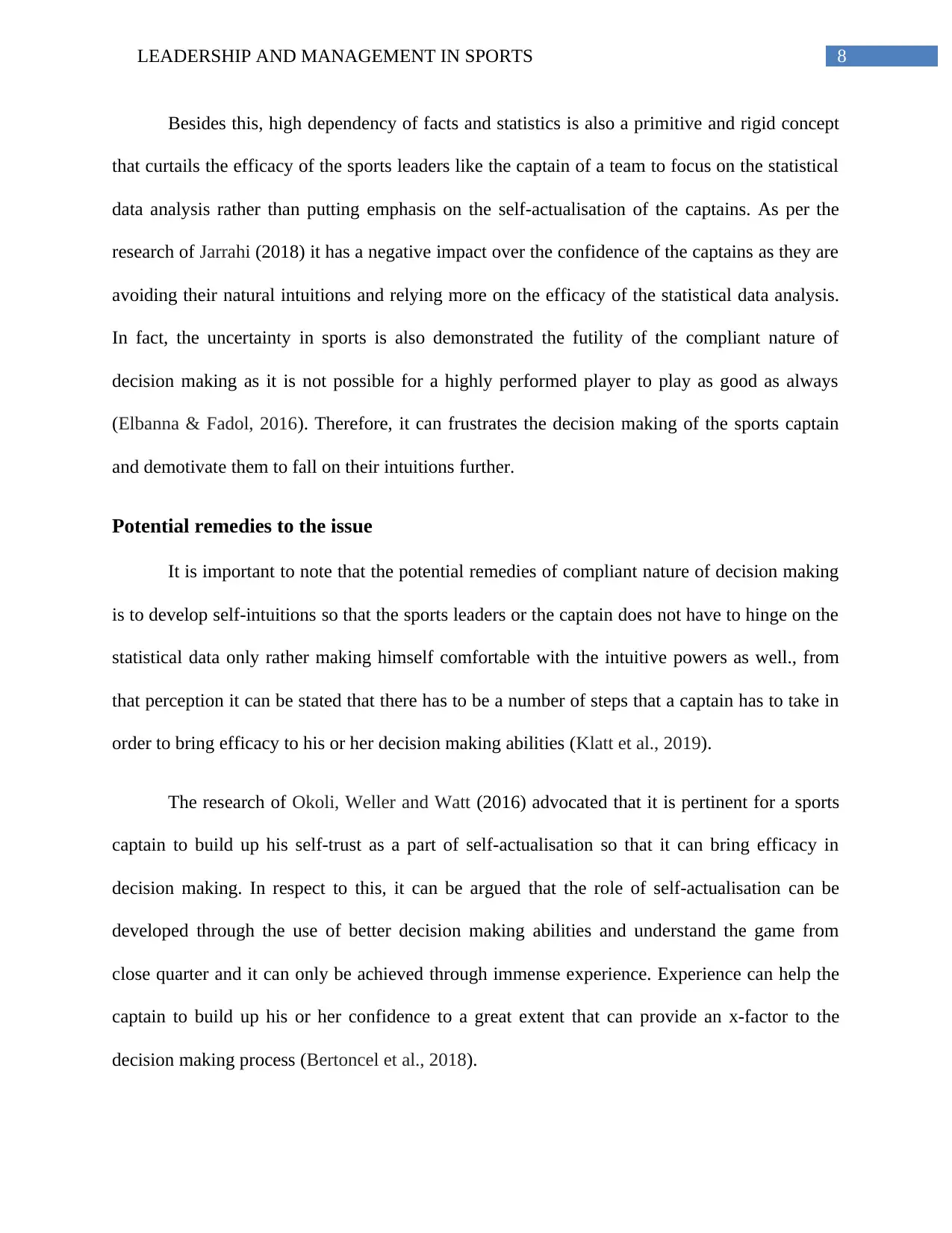
8LEADERSHIP AND MANAGEMENT IN SPORTS
Besides this, high dependency of facts and statistics is also a primitive and rigid concept
that curtails the efficacy of the sports leaders like the captain of a team to focus on the statistical
data analysis rather than putting emphasis on the self-actualisation of the captains. As per the
research of Jarrahi (2018) it has a negative impact over the confidence of the captains as they are
avoiding their natural intuitions and relying more on the efficacy of the statistical data analysis.
In fact, the uncertainty in sports is also demonstrated the futility of the compliant nature of
decision making as it is not possible for a highly performed player to play as good as always
(Elbanna & Fadol, 2016). Therefore, it can frustrates the decision making of the sports captain
and demotivate them to fall on their intuitions further.
Potential remedies to the issue
It is important to note that the potential remedies of compliant nature of decision making
is to develop self-intuitions so that the sports leaders or the captain does not have to hinge on the
statistical data only rather making himself comfortable with the intuitive powers as well., from
that perception it can be stated that there has to be a number of steps that a captain has to take in
order to bring efficacy to his or her decision making abilities (Klatt et al., 2019).
The research of Okoli, Weller and Watt (2016) advocated that it is pertinent for a sports
captain to build up his self-trust as a part of self-actualisation so that it can bring efficacy in
decision making. In respect to this, it can be argued that the role of self-actualisation can be
developed through the use of better decision making abilities and understand the game from
close quarter and it can only be achieved through immense experience. Experience can help the
captain to build up his or her confidence to a great extent that can provide an x-factor to the
decision making process (Bertoncel et al., 2018).
Besides this, high dependency of facts and statistics is also a primitive and rigid concept
that curtails the efficacy of the sports leaders like the captain of a team to focus on the statistical
data analysis rather than putting emphasis on the self-actualisation of the captains. As per the
research of Jarrahi (2018) it has a negative impact over the confidence of the captains as they are
avoiding their natural intuitions and relying more on the efficacy of the statistical data analysis.
In fact, the uncertainty in sports is also demonstrated the futility of the compliant nature of
decision making as it is not possible for a highly performed player to play as good as always
(Elbanna & Fadol, 2016). Therefore, it can frustrates the decision making of the sports captain
and demotivate them to fall on their intuitions further.
Potential remedies to the issue
It is important to note that the potential remedies of compliant nature of decision making
is to develop self-intuitions so that the sports leaders or the captain does not have to hinge on the
statistical data only rather making himself comfortable with the intuitive powers as well., from
that perception it can be stated that there has to be a number of steps that a captain has to take in
order to bring efficacy to his or her decision making abilities (Klatt et al., 2019).
The research of Okoli, Weller and Watt (2016) advocated that it is pertinent for a sports
captain to build up his self-trust as a part of self-actualisation so that it can bring efficacy in
decision making. In respect to this, it can be argued that the role of self-actualisation can be
developed through the use of better decision making abilities and understand the game from
close quarter and it can only be achieved through immense experience. Experience can help the
captain to build up his or her confidence to a great extent that can provide an x-factor to the
decision making process (Bertoncel et al., 2018).
⊘ This is a preview!⊘
Do you want full access?
Subscribe today to unlock all pages.

Trusted by 1+ million students worldwide
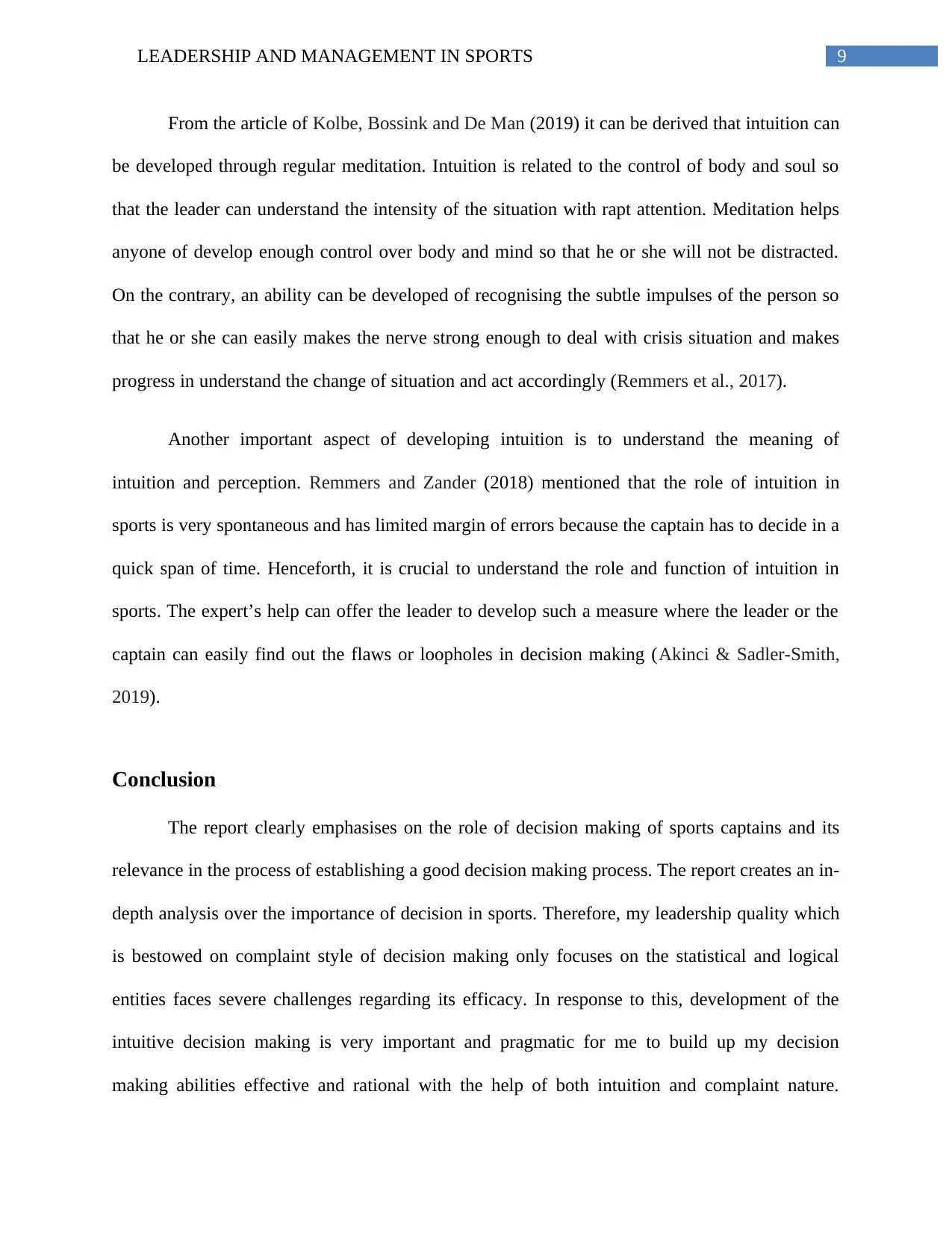
9LEADERSHIP AND MANAGEMENT IN SPORTS
From the article of Kolbe, Bossink and De Man (2019) it can be derived that intuition can
be developed through regular meditation. Intuition is related to the control of body and soul so
that the leader can understand the intensity of the situation with rapt attention. Meditation helps
anyone of develop enough control over body and mind so that he or she will not be distracted.
On the contrary, an ability can be developed of recognising the subtle impulses of the person so
that he or she can easily makes the nerve strong enough to deal with crisis situation and makes
progress in understand the change of situation and act accordingly (Remmers et al., 2017).
Another important aspect of developing intuition is to understand the meaning of
intuition and perception. Remmers and Zander (2018) mentioned that the role of intuition in
sports is very spontaneous and has limited margin of errors because the captain has to decide in a
quick span of time. Henceforth, it is crucial to understand the role and function of intuition in
sports. The expert’s help can offer the leader to develop such a measure where the leader or the
captain can easily find out the flaws or loopholes in decision making (Akinci & Sadler-Smith,
2019).
Conclusion
The report clearly emphasises on the role of decision making of sports captains and its
relevance in the process of establishing a good decision making process. The report creates an in-
depth analysis over the importance of decision in sports. Therefore, my leadership quality which
is bestowed on complaint style of decision making only focuses on the statistical and logical
entities faces severe challenges regarding its efficacy. In response to this, development of the
intuitive decision making is very important and pragmatic for me to build up my decision
making abilities effective and rational with the help of both intuition and complaint nature.
From the article of Kolbe, Bossink and De Man (2019) it can be derived that intuition can
be developed through regular meditation. Intuition is related to the control of body and soul so
that the leader can understand the intensity of the situation with rapt attention. Meditation helps
anyone of develop enough control over body and mind so that he or she will not be distracted.
On the contrary, an ability can be developed of recognising the subtle impulses of the person so
that he or she can easily makes the nerve strong enough to deal with crisis situation and makes
progress in understand the change of situation and act accordingly (Remmers et al., 2017).
Another important aspect of developing intuition is to understand the meaning of
intuition and perception. Remmers and Zander (2018) mentioned that the role of intuition in
sports is very spontaneous and has limited margin of errors because the captain has to decide in a
quick span of time. Henceforth, it is crucial to understand the role and function of intuition in
sports. The expert’s help can offer the leader to develop such a measure where the leader or the
captain can easily find out the flaws or loopholes in decision making (Akinci & Sadler-Smith,
2019).
Conclusion
The report clearly emphasises on the role of decision making of sports captains and its
relevance in the process of establishing a good decision making process. The report creates an in-
depth analysis over the importance of decision in sports. Therefore, my leadership quality which
is bestowed on complaint style of decision making only focuses on the statistical and logical
entities faces severe challenges regarding its efficacy. In response to this, development of the
intuitive decision making is very important and pragmatic for me to build up my decision
making abilities effective and rational with the help of both intuition and complaint nature.
Paraphrase This Document
Need a fresh take? Get an instant paraphrase of this document with our AI Paraphraser

10LEADERSHIP AND MANAGEMENT IN SPORTS
Therefore, it can be stated that the report not only finds out the issues in sports leadership but
also provides a detailed narration of the remedies that a sport leader must follow to generate
better decision making in sports.
Therefore, it can be stated that the report not only finds out the issues in sports leadership but
also provides a detailed narration of the remedies that a sport leader must follow to generate
better decision making in sports.
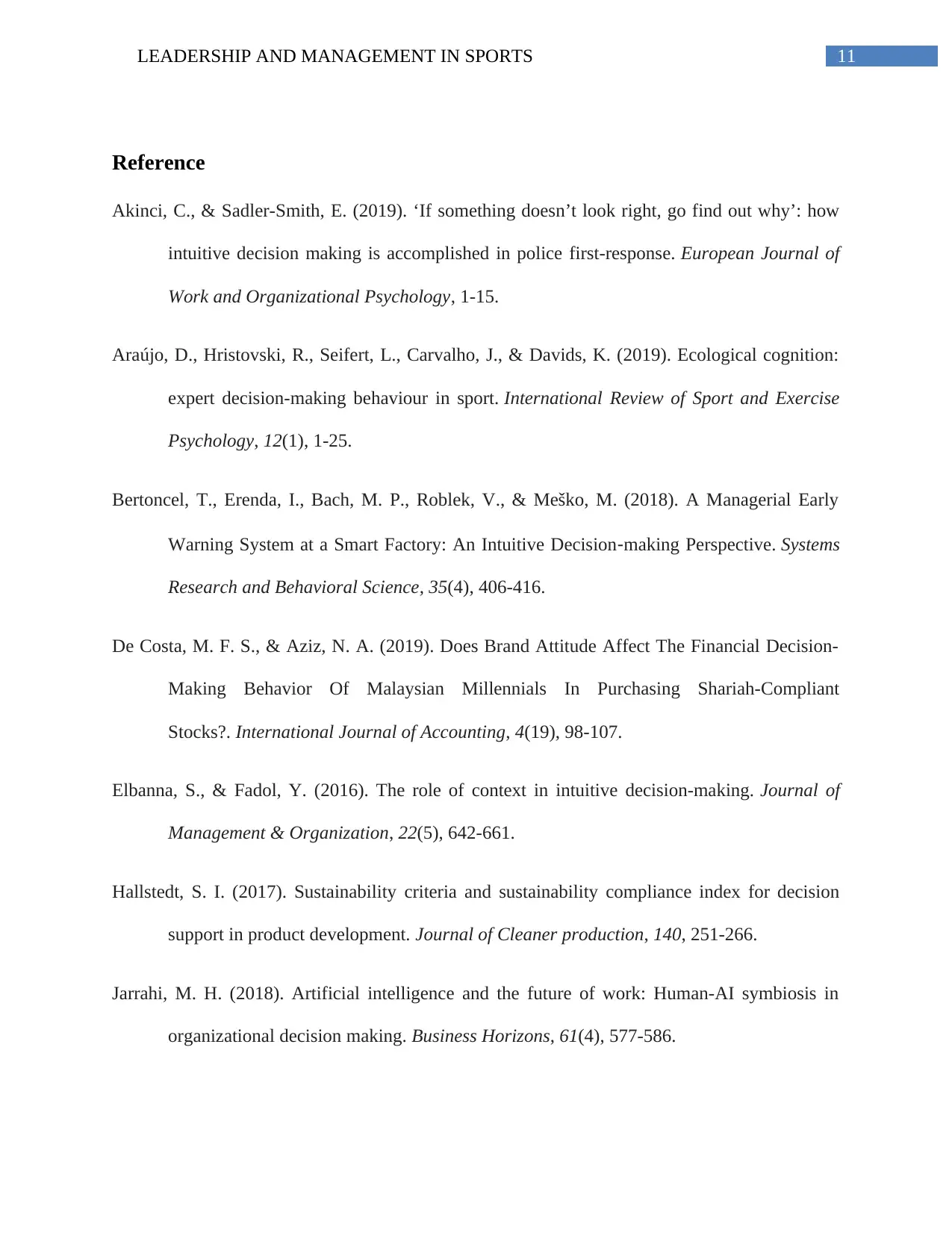
11LEADERSHIP AND MANAGEMENT IN SPORTS
Reference
Akinci, C., & Sadler-Smith, E. (2019). ‘If something doesn’t look right, go find out why’: how
intuitive decision making is accomplished in police first-response. European Journal of
Work and Organizational Psychology, 1-15.
Araújo, D., Hristovski, R., Seifert, L., Carvalho, J., & Davids, K. (2019). Ecological cognition:
expert decision-making behaviour in sport. International Review of Sport and Exercise
Psychology, 12(1), 1-25.
Bertoncel, T., Erenda, I., Bach, M. P., Roblek, V., & Meško, M. (2018). A Managerial Early
Warning System at a Smart Factory: An Intuitive Decision‐making Perspective. Systems
Research and Behavioral Science, 35(4), 406-416.
De Costa, M. F. S., & Aziz, N. A. (2019). Does Brand Attitude Affect The Financial Decision-
Making Behavior Of Malaysian Millennials In Purchasing Shariah-Compliant
Stocks?. International Journal of Accounting, 4(19), 98-107.
Elbanna, S., & Fadol, Y. (2016). The role of context in intuitive decision-making. Journal of
Management & Organization, 22(5), 642-661.
Hallstedt, S. I. (2017). Sustainability criteria and sustainability compliance index for decision
support in product development. Journal of Cleaner production, 140, 251-266.
Jarrahi, M. H. (2018). Artificial intelligence and the future of work: Human-AI symbiosis in
organizational decision making. Business Horizons, 61(4), 577-586.
Reference
Akinci, C., & Sadler-Smith, E. (2019). ‘If something doesn’t look right, go find out why’: how
intuitive decision making is accomplished in police first-response. European Journal of
Work and Organizational Psychology, 1-15.
Araújo, D., Hristovski, R., Seifert, L., Carvalho, J., & Davids, K. (2019). Ecological cognition:
expert decision-making behaviour in sport. International Review of Sport and Exercise
Psychology, 12(1), 1-25.
Bertoncel, T., Erenda, I., Bach, M. P., Roblek, V., & Meško, M. (2018). A Managerial Early
Warning System at a Smart Factory: An Intuitive Decision‐making Perspective. Systems
Research and Behavioral Science, 35(4), 406-416.
De Costa, M. F. S., & Aziz, N. A. (2019). Does Brand Attitude Affect The Financial Decision-
Making Behavior Of Malaysian Millennials In Purchasing Shariah-Compliant
Stocks?. International Journal of Accounting, 4(19), 98-107.
Elbanna, S., & Fadol, Y. (2016). The role of context in intuitive decision-making. Journal of
Management & Organization, 22(5), 642-661.
Hallstedt, S. I. (2017). Sustainability criteria and sustainability compliance index for decision
support in product development. Journal of Cleaner production, 140, 251-266.
Jarrahi, M. H. (2018). Artificial intelligence and the future of work: Human-AI symbiosis in
organizational decision making. Business Horizons, 61(4), 577-586.
⊘ This is a preview!⊘
Do you want full access?
Subscribe today to unlock all pages.

Trusted by 1+ million students worldwide
1 out of 14
Related Documents
Your All-in-One AI-Powered Toolkit for Academic Success.
+13062052269
info@desklib.com
Available 24*7 on WhatsApp / Email
![[object Object]](/_next/static/media/star-bottom.7253800d.svg)
Unlock your academic potential
Copyright © 2020–2025 A2Z Services. All Rights Reserved. Developed and managed by ZUCOL.





